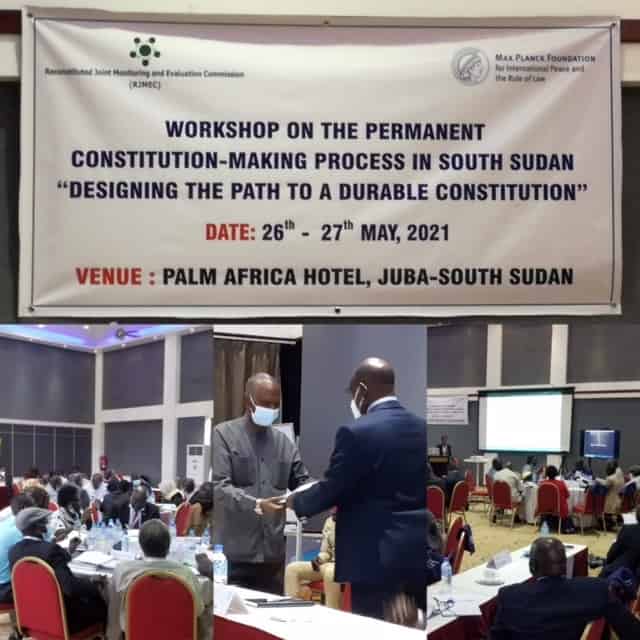Workshop on the Permanent Constitution-Making Process successfully completed
Following three days of extensive deliberations, the Workshop on the Permanent Constitution-Making Process for South Sudan came to a successful conclusion on Friday, 28 May 2021 with the adoption of a resolution document that will inform the legislation that will govern the process. Over the three days from 26 to 28 May 2021, the delegates at the Workshop deliberated on and engaged in robust negotiations on various thematic areas including the drafting process, the roles and mandates of institutions, modalities of public participation, and the sequencing in the Constitution-Making Process. The deliberations were facilitated and moderated by representatives of the Max Planck Foundation and convened by the Revitalised Joint Monitoring and Evaluation Commission (RJMEC).
Despite representing different parties and stakeholder groups, the delegates conducted the deliberations in an atmosphere of consensus and compromise, with all the representatives of parties and stakeholders determined to move forward with South Sudan’s permanent Constitution-making process. This atmosphere was key to the successful conclusion of the workshop and the unanimous adoption of 45 resolutions, which will inform the legislation that will govern the permanent Constitution-making process in South Sudan.
The Workshop closing ceremony took place on 28 May 2021 and was attended, amongst others, by Hon. Justice Ruben Madol Arol, the Minister for Justice and Constitutional Affairs, HE Dr Ismail Wais, the IGAD Special Representative to South Sudan, and HE General Charles Tai Gituai, RJMEC Interim Chairperson. All three dignitaries commended the participants on fulfilling their duty by putting South Sudan first to reach a consensus on decisions of importance to the constitutional process in the country.
Delegates at the Workshop thereafter appended their signatures to the resolution document, thereby signalling their constituencies’ acceptance of the terms of the resolutions.
With the successful conclusion of the workshop and adoption of the Resolution document, the Ministry of Justice and Constitutional Affairs thereby have the parameters by which to draft the legislation that will govern the Permanent Constitution-making process in South Sudan.
Activities of the Foundation to facilitate the Workshop have been funded by the German Federal Foreign Office.

